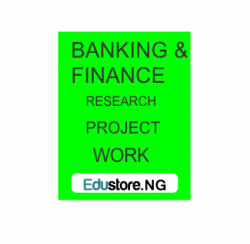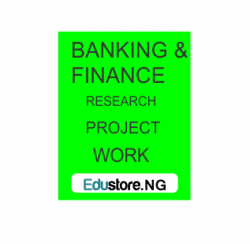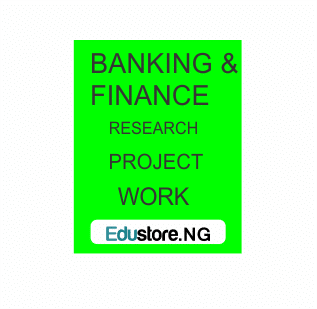ABSTRACT
The study explores the impact of foreign direct investment on economic growth in Ghana. The objectives of this study were to examine the impact of foreign direct investment on development in Ghana, to examine the impact of foreign direct investment on economic growth in Ghana. The data used were sourced from the worldbank.org for the period 1992 to 2018. Two research questions guided the study. The data collected were analyzed using multiple linear regression. The result revealed that foreign direct investment led to the development of the economy of Ghana. Following the findings, it was recommended that government should embark on policies of increasing foreign direct investment as it has significant impact on the economy, it should concentrate efforts in fine-tuning the existing policy measures which will also stimulate saving behaviour of all economic agents, there is need to boost the value of transactions in the Ghana economy through joint venture with foreign investors.
Keywords: foreign direct investment, economy growth, Ghana.
TABLE OF CONTENTS
Title page – – – – – – – – i
Declaration – – – – – – – ii
Certification – – – – – – – iii
Dedication – – – – – – – iv
Acknowledgement – – – – – – v
Abstract – – – – – – – – vi
Table of content – – – – – – – vii
CHAPTER ONE :INTRODUCTION
1.1. Background to the study – – – – – 1
1.2. Statement of problem – – – – – – 3
1.3. Research questions – – – – – – 4
1.4. Objectives of the study – – – – – 4
1.5. Research hypotheses – – – – – 5
1.6. Significance of the study – – – – – 5
1.6. Scope and limitations of the study – – – 6
1.7. Organization of the study – – – – – 7
CHAPTER TWO: LITERATURE REVIEW
2.1. Conceptual Literature – – – – – 8
2.1.1 Economic Growth – – – – 8
2.1.2. Foreign Direct Investment – – – – 9
2.2. Theoretical Literature- – – – – – 12
2.2.1. Economic growth theories – – – 12
2.2.1.1. The neoclassical growth model (Solos_Swan model of
economic growth) – – – – – 12
2.2.1.2. Harrod_Domar model – – – – – 14
2.2.1.3. Endogenous growth theory – – – – 15
2.3. Empirical Literature – – – – – 16
2.4. Theoretical Framework – – – – 26
2.5. Gaps in Literature – – – – – 27
CHAPTER THREE: RESEARCH METHODOLOGY
3.1. Types and sources of data- – – – – – 29
3.2. Method of estimation – – – – – 29
3.3. Model specification- – – – – – 29
3.4. Evaluation criteria. – – – – – – 31
CHAPTER FOUR: PRESENTATION AND ANALYSIS OF
RESULTS
4.1. presentation of results – – – – – 34
4.2. Analysis of results – – – – – – 35
4.2. Summary of major findings – – – – – 38
4.3. Policy implication of findings- – – – – 38
CHAPTER FIVE: SUMMARY, CONCLUSION AND RECOMMENDATIONS
5.1. Summary of the finding – – – – – 39
5.2. Conclusion – – – – – – – 39
5.3. Recommendations – – – – – – 40
5.5. Limitations to the Study – – – – – 40
5.6. Suggestions for Further Studies – – – – 41
REFERENCES – – – – – – 42
APPENDICES – – – – – – – – 47
CHAPTER ONE
INTRODUCTION
1.1 Background to the Study
Over the past decades, one of the objectives of policy makers in Ghana has been the maintenance of economic stability that supports the growth of her economy. Ghana economic strategy since 1992 has focused on macroeconomic stabilization and structural reform in a democratic environment. Economic growth and development in a country should not be overemphasized.
Studies have shown that inflow of foreign direct investment (FDI) can be quite beneficial for the host economy. This applies particularly to developing economy, it’s a generally acceptable means of incorporating new knowledge from abroad. The effect of FDI in the host country varies depending on the particular country and the policy environment (Nunnenkamp and Spatz, 2004). Several works of literature have emphasized the significance of FDI as a capital creator for development project in West African countries (Borensztein, et al, 1998; Acemoglu, et al, 2006). Contries therefore develop strategies to attract more FDI into their economies (Mengistus and Adams, 2007).
To attract FDI inflows, developing countries have generated economic agendas such as tax concessions, provision of loan at low interest rates, grants, allocation of subsidies, increased investment on infrastructure, development of export processing zones and other concessions (Raheem and Oyinlola, 2013). Various policy regimes have been implemented by Ghana government to carry out market-friendly economic reform programmes, such as the implementation of the Economic Reform Programme (ERP) in 1983, the adoption of the Mining Code in 1986, the enactment of the Investment Code in 1994 and the Free Zone Act in1995. Ghana has greatly improved the business environment for foreign and domestic investors.
FDI is seen as a cross-border investment which are made by investors with view of establishing lasting financial interest in an industry or enterprise and trying to exert a degree of influence on the operations of the enterprise and where the foreign investors holds an interest of at least 10% in equity capital (Duce, 2003). The inflow of foreign direct investment from foreign investing countries and individual investors into Ghana’s economy has been playing a major role in the development and well-being of the nation’s citizen and expatriates. Political pressure influence the allocation and distribution of FDI inflow into some sectors and regions within their economy at the expense of others.
While the variety of case study and small country comparison confirms the idea that FDI has a positive impact (King, 2000; King and Aleksandra, 2006), other researchers contend that FDI has had primarily negative implications for countries including the destruction of existing production networks, promotion of low-wage, low value-added manufacturing and permanent dependence on foreign economic actors. It is against this backdrop that this study research on the impact of foreign direct investment on economic growth in Ghana. An evaluation of FDI on economic growth especially in Ghana has recently received attention in literature. This is because a proper understanding of this impacts will be useful in the settings of liberalization policy.
1.2. Statement of the problem
Economic growth in a modern economy hinges on an efficient and effective financial sector and political environment that encourages foreign investment and mobilizes capital for productive projects. Absence of FDI could leave most productive projects which carry developmental agenda unexploited.
It is strongly argued that FDI can have strong positive effects on economic performance. However, after the prescribed reform agenda, the domestic economy has failed to experience impressive performance such as attraction of foreign investment or halt capital flight. FDI generates tremendous financial booms and busts in Ghana economy but these booms and busts have not intensified in the long-run. The debate over the macroeconomic effect of FDI on developing economies remains a controversial issue.
The reform agenda of Ghana lost some momentum in the late 1990s. Despite liberalizing investment rules and improving the business climate, Ghana did not receive as much FDI as the government has expected. Though absolute FDI increased in the 90s, they started from a low level between 1993 and 2005. Annual FDI inflows fluctuated between US $50 million and US $250 million.
In the light of the above, this study sought to examine the impact of foreign direct investment on economic growth in Ghana. This will help in providing understanding on the impact of FDI on economic growth in the Ghanaian economy.
- Research Questions
This study will be based on the following Research Questions:
- What is the impact of foreign direct investment on development in Ghana?
- What is the impact of foreign direct investment on economic growth in Ghana?
1.4. Objectives of the Study
The general objective of this study was to determine the extent to which foreign direct investment has led to economic growth in Ghana. To achieve this general objective, the following specific objectives will be examined.
- To examine the impact of foreign direct investment on development in Ghana.
- To examine the impact of foreign direct investment on economic growth in Ghana.
1.5 Research Hypotheses
- H0: foreign direct investment has no significant impact on development.
- H0: foreign direct investment has no significant impact on economic growth.
1.6 Significance of the Study
This study will be of utmost importance to investors, government and the researchers because it will provide policy recommendations to the various Ghanaian stakeholders taking adequate measures in the economy for rapid growth and industrialization. It is hoped that the exploration of the foreign exchange market, global market, official and parallel market will provide a broad view of the operations of the markets to investors and government. The changing character of the financial sector especially, the banking sector reforms and global financial crises that have both affected exchange rate and financial flows in recent times will push studies on foreign direct investment to new evidence(s). It will contribute to existing literature on the subject matter by investigating empirically the role which foreign direct investment plays in economic growth and development of the country. This study will be of benefit to;
The Academia: members of the academia will find the study relevant as it will also form basis for further research and a reference tool for academic works.
Government: this study will reveal to the government happenings in the foreign exchange market, global market, official and parallel market. Formulation and implementation of policies based on this findings would ensure growth.
Investors: this study shall also be valuable to the investors especially those who may have research interest as it shall guide their private investment decisions.
1.7 Scope of the Study
This research work is to examine the impact of foreign direct investment on economic growth in Ghana. The study covered the period of 1992-2018. This is due to the various policy regime where the country went through a major structural changes such as the Investment Code of 1994 and economic data could be recorded from that period.
1.8 Organization of the Study
This study is divided into five chapters. Chapter one is introduction which consists of the background to the study, statement of problem, research questions, research hypotheses, objectives of the study, the significance of the study, the scope and limitations of the study and finally the organization of the study. Chapter two deals with the literature review which consists of the conceptual literature, theoretical literature, empirical literature, theoretical framework, gaps in literature. Chapter three gives the methodology including techniques of analysis of data, types and sources of data, method of estimation and model specification. Chapter four is presentation and analysis of results which contains the presentation of results, interpretation of results and summary of major findings. Finally, Chapter five gives the summary, conclusion and recommendations.
DOWNLOAD COMPLETE WORK- For Reference Only: Materials are for research, citation, and idea generation purposes and not for submission as your original final year project work.
- Avoid Plagiarism: Do not copy or submit this content as your own project. Doing so may result in academic consequences.
- Use as a Framework: This complete project research material should guide the development of your own final year project work.
- Academic Access: This platform is designed to reduce the stress of visiting school libraries by providing easy access to research materials.
- Institutional Support: Tertiary institutions encourage the review of previous academic works such as journals and theses.
- Open Education: The site is maintained through paid subscriptions to continue offering open access educational resources.






